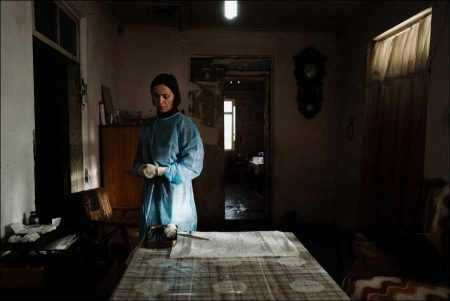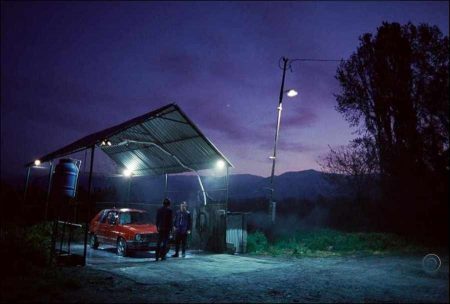April movie storyline. Nina (Ia Sukhitashvili) is an ob-gyn living an austere life in eastern Georgia at the foot of the Greater Caucasus mountains. Like the landscapes that surround her, Nina possesses a stark and rugged character — easily distinguishable in a place where independent women can find themselves at a disadvantage. Nina endures the hardships of life, and allows her pain to fuel her ambitions. Despite constant obstacles, she is steadfast in her choices and grounded by her mission. As well as doing her ob-gyn job, tending to those in the throes of excruciating labour, she performs clandestine abortions for desperate women on her own time.
When a baby dies under her care shortly after delivery at the hospital, Nina’s morals and professionalism come under scrutiny and she is investigated when rumours about the illegal abortions reach the administration. While she has some protection from David (Kakha Kintsurashvili), a colleague and former lover — as well as receiving the benefit of the doubt from the head doctor (Merab Ninidze) — outside pressures are mounting, Nina’s reputation threatens the health of the clinic, and there is a great deal at stake for her.
A powerful convergence of existence and womanhood, April is the second feature of writer-director Dea Kulumbegashvili, whose film Beginning had its World Premiere at the Festival in 2020. Shot by Arseni Khachaturan (Bones and All, The Idol, Beginning), edited by Jacopo Ramella Pajrin, and with an original score by Matthew Herbert, April is a tour de force.
April (Georgian: აპრილი, romanized: ap’rili) is a 2024 drama film written and directed by Déa Kulumbegashvili. It stars Ia Sukhitashvili, Kakha Kintsurashvili and Merab Ninidze. The film tells the stor of Nina, an obstetrician in rural Georgia who aids patients seeking abortions despite legal prohibition, must defend her values and actions when she is accused of negligence and subject to investigation. April had its world premiere at the 81st Venice International Film Festival, where it won the Special Jury Prize.
Film Review for April
ea Kulumbegashvili wastes no time establishing the aesthetic extremes to which her film April will stretch. The opening shot lingers on a lurking humanoid creature in a lightless, liminal space. Arseni Khachaturan’s camera remains still and detached while observing this figure with droopy—and seemingly decaying—skin as it lumbers into the shadows.
The mysterious entity reappears sporadically throughout the film, but the focus of April quickly shifts toward a more familiar nonverbal being. Only an interstitial sequence of pouring rain separates that abstraction from a jarring take of realism where a god’s-eye view captures an unsimulated live birth in a delivery room. Within 10 minutes, Kulumbegashvili bridges a stylistic range from Jonathan Glazer’s formalism to Cristian Mungiu’s naturalism.
While April, Kulumbegashvili’s follow-up to Beginning, may be a film defined by its contrasts, the filmmaker never presents them as contradictions. Any paired oppositions in the film—life and death, birth and abortion, realism and surrealism, medical and metaphysical, close-ups and long shots—don’t necessarily negate one another. All perspectives fall under the banner of human experience and, from the right point of view, can be surprisingly complementary.
The film’s point of view mirrors that of its protagonist, Ia Sukhitashvili’s obstetrician Nina. Her primary line of work involves operating out of a hospital maternity ward in the rural eastern reaches of Georgia, but she also takes care of pregnancies in a different way by performing illicit abortions in homes. Nina senses no cognitive dissonance in her dual functions, nor does she feel a need to compartmentalize the two roles. To her, each procedure empowers women by equipping them with the choice of when they wish to become mothers.
The private cohesion of these disparate spheres all comes undone by one botched delivery, which drives the reeling father (Sandro Kalandadze) of a deceased infant to speak the open secret of Nina’s moonlighting gig. As he thrusts the full range of her medical activity into public view, she faces a formal investigation by the hospital around the outcome. The insinuation underlying the inquisition is that there must have been some spillover from her abortion practice affecting the result. Though she operates according to her own internal logic, the inciting incident of April sets up the law bringing her to heel.
With her bearings shaken, Nina begins to push the limits of her internal code of ethics. Even as she maintains professionalism with her patients, she tries to put her thumb on the scale of her performance review by rekindling a past flame with her colleague David (Kakha Kintsurashvili). While Nina preaches safe sex and birth control to the young women who visit her at the hospital, she engages in anonymous hook-ups with men where the threat of violence looms large.
A steely but soulful Sukhitashvili keeps Nina’s motives aptly inscrutable as the woman is torn between per professional duties and her personal feelings. But like the ever-present breathing noises that permeate the soundscape of April, so, too, do the traces of her hardscrabble humanity peek through cinematographer Arseni Khachaturan’s austere images. The film is always at its most compelling when Kulumbegashvili grounds a scene in the immediacy of Nina’s presence, even if she’s only peeking into a shot from the edge of the frame.
April’s frames seek to embody a dizzying span of human experience, even if Kulumbegashvili occasionally strains to corral it. The strength of the spell that she casts breaks a bit as ponderous sequences begin to subsume the narrative while Nina awaits the consequences of her actions. The film opens outward as it draws to a close, inviting viewers to share the space with scene durations that last well beyond the delivery of the final plot point.
Where ambiguity stops and underdevelopment begins proves as difficult to discern as any other distinction in April. The film is a little too content with simply reframing the broader dialogue around abortion, not adding to it beyond harnessing all the sensations of Nina’s navigation of Georgian society’s double standards. Kulumbegashvili could likely reshape the conversation through the raw power of her directorial vision. Her sophomore feature leaves no doubt she’s a great filmmaker, though it does suggest that she’s still yet to make her first truly great film.
April (2024)
Directed by: Déa Kulumbegashvili
Starring: Ia Sukhitashvili, Kakha Kintsurashvili, Merab Ninidze, Roza Kancheishvili, Ana Nikolava, David Beradze, Sandro Kalandadze, Tosia Doloiani, Beka Songulashvili
Screenplay by: Déa Kulumbegashvili
Production Design by:
Cinematography by: Arseni Khachaturan
Film Editing by: Jacopo Ramella Pajrin
Costume Design by:
Set Decoration by: Karin Betzler
Art Direction by: Beka Tabukashvili
Music by: Matthew Herbert
MPAA Rating: None.
Distributed by: Pyramide Distribution (France)
Release Date: September 5, 2024 (Venice), October 25, 2024 (United States)
Views: 34






